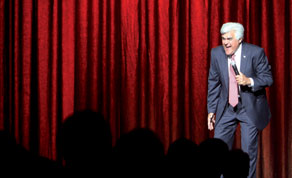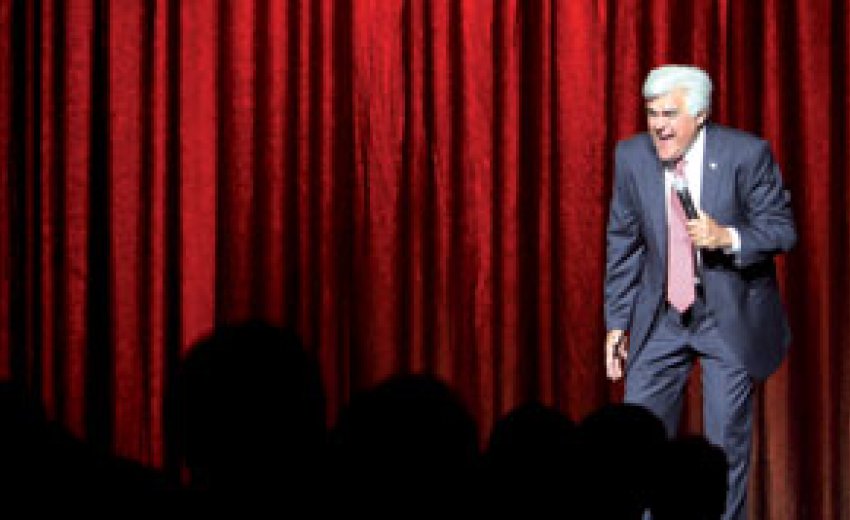 |
| Jay Leno: responding to a Leno joke, India’s foreign minister has threatened to lodge a formal protest with US authorities. And an Indian-American group in New York has filed a complaint with the Federal Communications Commission |
The expressions of hurt and outrage in India that followed recent jokes by late-night comedian Jay Leno and the hosts of the BBC program Top Gear, along with treason charges against a cartoonist, have sparked a debate here: Is the nation too thin-skinned to take a joke?
Leno ruffled feathers while poking fun at Republican presidential candidate Mitt Romney’s wealth. The host of NBC’s Tonight Show mentioned the former Massachusetts governor’s summer home as he showed a picture of the Golden Temple in Amritsar, the Sikhs’ most sacred site.
This followed an episode of the auto show Top Gear in which host Jeremy Clarkson and his colleagues drove around India making jokes about Indian food, clothes, sanitation and trains. In one scene, they ride through a slum in an ageing Jaguar with a toilet fitted into its trunk, a play on India’s reputation for “Delhi belly”.
When the jokes made headlines in India, however, many weren’t amused.
Responding to the Leno joke, India’s foreign minister threatened to lodge a formal protest with US authorities. Indian-American plaintiff Randeep Dhillon filed a lawsuit against Leno in Los Angeles County Superior Court, contending that the skit “falsely portrays the holiest place in the Sikh religion as a vacation resort owned by a non-Sikh”. Online petitions sprung up. And an Indian-American group in New York filed a complaint with the Federal Communications Commission.
“Making fun of the gods is no joke,” said Gurnam Singh, president of a Sikh-dominated political party in the northwestern state of Punjab. “If he doesn’t apologise, we will file a case against him just like Randeep Dhillon did.”
After the Top Gear episode aired, India’s London embassy called for an apology and condemned the programme as “replete with cheap jibes, tasteless humour” and insensitive.
In another development this year, political cartoonist Aseem Trivedi, 25, was charged with treason and insulting Indian national sentiments by the western state of Maharashtra after cartoons critical of the government appeared on a website. The charges carry a three-year jail sentence and heavy fines.
“Are all Western countries clean? Which Western country does not have problems?” said Chandra Shekhar Rai, a top official in the nationalist Bharatiya Janata Party. “And if a cartoonist can’t decide where to draw the line, the authorities will have to take charge, not only banning them but jailing them.”
Although some of the jokes may be uninformed or in poor taste, critics say India’s tendency to react strongly to relatively minor perceived slights can ultimately focus more attention on the issue and dent its international reputation.
“It really embarrasses me that Indians should be so chippy,” said Tavleen Singh, an author and columnist. “I’m a Sikh, but when I was growing up, we were among the most confident of Indians. We’re used to Sikh jokes, many by Sikhs, about turbans, the whole works. This is nonsense.”
Columnist Soumya Bhattacharya, writing in New Delhi’s Hindustan Times newspaper, described Indians as dour and touchy people who often find it hard to see humour in a situation.
“If only the British had left behind, along with a rail network, more of their sense of irony and self-deprecation,” Bhattacharya wrote.
The reaction also called into question for some the country’s commitment to free speech. “India’s lost its sense of humour,” cartoonist Trivedi said. “If the government gags its citizens, how are we going to grow?”
Author Salman Rushdie was pressured not to attend a major literary festival last month after protests. Sony Pictures’ The Girl With the Dragon Tattoo was banned after producers refused to cut what censors called “unsuitable” scenes. And the government recently outlined new restrictive rules for the Internet.
Ash Chandler, an American of Indian descent and one of India’s first stand-up comics working in English, said he quickly learned on landing in Mumbai a dozen years ago that certain mainstays of Western comedy are best avoided.
“Religion is a big no-no,” he said. “Zealots are going to react, there’s no way to avoid it, but free speech should be protected in a democracy. Context is crucial. Jeremy Clarkson was poking at least as much fun at his own constitution, his inability to eat spicy food.”
Chandler said that politicians are fair game in India as long as they are foreign. As a result, he focuses on making fun of President Obama and former presidents Clinton and George W Bush.
NBC has not commented, but the State Department dismissed India’s concerns, saying the Leno skit appeared to be satirical and was protected under US free-speech laws. The BBC has also defended the Top Gear episode, insisting the jokes were at the expense of the hosts.
“Our film showed the charm, the beauty, the wealth, the poverty and the idiosyncrasies of India,” the BBC said in a statement. “But there’s a vast difference between showing a country, warts and all, and insulting it.”
Analysts say several factors appear to be at work. India, China and other developing countries haven’t forgotten their often brutal colonial past, making them sensitive to any criticism, particularly from the West, said New Delhi sociologist Patricia Oberoi.
Some analysts also note an increasingly vocal Indian middle class and overseas diaspora keen to protect the nation’s image amid aspirations of its being a future superpower. Others say state elections now underway have made the government particularly careful not to brook offense, appear weak or risk tensions between religious communities that have turned deadly in the past.
“Jay Leno isn’t the wisest man on the planet…,” said Suhel Seth, managing director at the marketing consulting firm Counselage India. “But let’s get real. India should be mature enough to endure the rough end of the stick. The entire world isn’t obliged to pander to its ego.”- The Los Angeles Times/MCT
